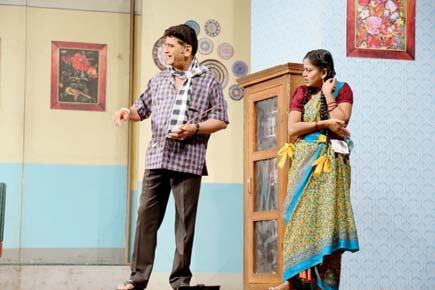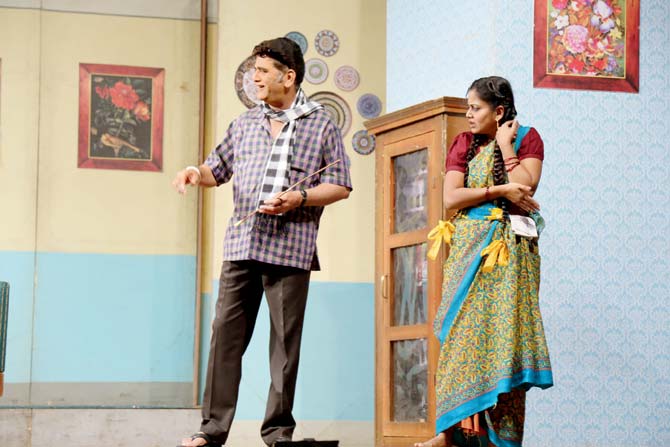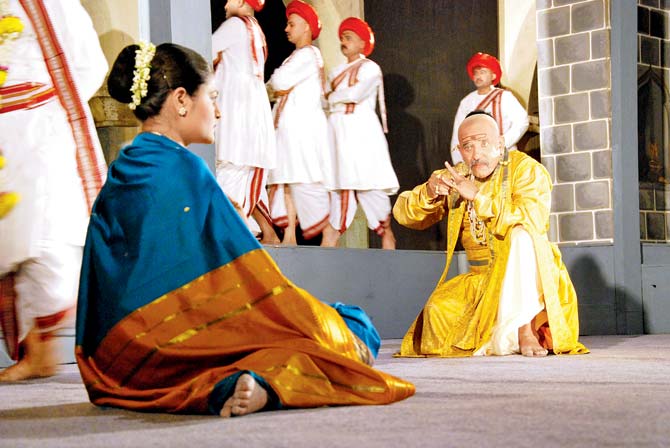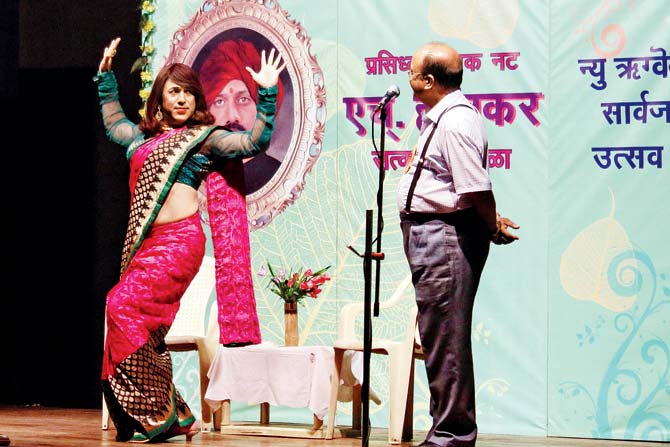Why Marathi theatre isn’t excited about the resurrection of Pula Deshpande’s Tee Phulrani


Hemangi Kavi and Dr Oak take on the roles of Manjula and Ashok Jahagirdar, previously enacted by Bhakti Barve and Satish Dubhashi respectively in Purushottam Lakshman Deshpande’s Tee Phulrani, which ran to 802 shows after opening in 1975
ADVERTISEMENT
 On the afternoon of January 29, 1975, when Indian National Theatre’s production Tee Phulrani opened to an 800-plus audience at Mumbai’s Ravindra Natya Mandir, playwright-director Purushottam Lakshman Deshpande (Pula) did not smile. He was expecting more — a ‘houseful’ sign at the booking counter. It was the least he expected for a play whose cultural rendering (from Bernard Shaw’s Pygmalion which influenced the Gujarati version Santu Rangili) had occupied him for three years. He had relocated himself from Pune to a small Worli tenement to audition each artiste; not to forget the four-month long 7 am rehearsals, considering the day jobs of artists like Bhakti Barve, Satish Dubhashi and Arvind Deshpande.
On the afternoon of January 29, 1975, when Indian National Theatre’s production Tee Phulrani opened to an 800-plus audience at Mumbai’s Ravindra Natya Mandir, playwright-director Purushottam Lakshman Deshpande (Pula) did not smile. He was expecting more — a ‘houseful’ sign at the booking counter. It was the least he expected for a play whose cultural rendering (from Bernard Shaw’s Pygmalion which influenced the Gujarati version Santu Rangili) had occupied him for three years. He had relocated himself from Pune to a small Worli tenement to audition each artiste; not to forget the four-month long 7 am rehearsals, considering the day jobs of artists like Bhakti Barve, Satish Dubhashi and Arvind Deshpande.

Madhav Abhyankar (right), who in 1994 resurrected the historical costume drama Ghashiram Kotwal, says that many in the Pune-based Theatre Academy termed him “foolishly ambitious” to attempt the feat and, aside from Dr Mohan Agashe, no one had applauded his work
After the fifth show (right up to the 802nd in 1989) Phulrani fulfilled Pula’s ‘houseful’ wish. It blossomed into a three-and-a-half hour popular lyrical drama on a flower seller’s transformation into a society lady. Shaw’s lampooning of British rigidity became Pula’s take on class prejudice and social mobility in Maharashtra, underlining the pomposity of cultivated speech in upper class refinement.

Pushkar Shrotri in Hasava Phasavi, who added a new flavour to actor Dilip Prabhavalkar’s six characters in the light Marathi comedy written by Prabhavalkar himself, last performed by Prabhavalkar in July 2000
When a play, as culturally loaded as Pula’s Phulrani (equated with the high-energy signature role of Bhakti Barve; mounted with newer artistes up to the nineties; last rendered by Waman Kendre as a failed musical in 2003 inviting censure) is mounted in 2016 by a first-time producer (Adonis Aviation owned by brother-sister duo Leena and Rahul Juvekar) whose competence lies in facilitating chartered helicopter flights, Marathi theatre circles display what is called the “He Kon Aale Tikojirao” (Who’s this smart a**?) syndrome. Perceived as an odd choice of Johnny-come-latelies [director Rajesh Deshpande (46), lead actress Hemangi Kavi (30), are known, but for sundry work in theatre, TV serials-films; supporting artistes lack aura], the new Phulrani initially attracted negative attention. Deshpande’s “minimal trimming” of the script (it is copyright-free after Pula and Sunitabai’s death) has also raised eyebrows, particularly from some of Pula’s family members. Deshpande told them about the “need for period-appropriate" editing,” of poetic passages. It is also observed that the cast, particularly Dr Girish Oak (the star face in the cast) playing the phonetics professor responsible for Phulrani’s makeover, has a tendency to add spur-of-the-moment lines to cash in on Pula’s humour. Dr Oak has denied these allegations, publicised in a section of the press on its 50th show.
“We are aware of the inviolability of the script penned by a master wordsmith. But every director deserves room for manoeuvre. Had Pula been alive, he would have granted us that room – his own stage version of Phulrani is different from the play he wrote. In fact, the published text is the working script” says Deshpande pointing towards an anonymous lobby (some of them have declined invitations to see the new avatar), which believes that only certain groups deserve to stage Pula. Veterans don’t go on record while raising objections. Those who criticised an inferior Phulrani, later claimed in private that they had not meant to derail the shows and that they stood for the spirit of experimentation in theatre. One director stated he had made a general comment on script sanctity, which was superimposed on the Phulrani episode by a mischievous mediaperson.
Rajesh Deshpande’s objection to Marathi theatre’s unwritten who’s-worthy-of-which-script parameter finds echoes in actor Madhav Abhyankar’s take on resuscitated productions. Abhyankar (53) resurrected the historical costume drama Ghashiram Kotwal in 1994 and has so far worked with first-time artistes and producers to keep the play alive for 22 years.
Pune-based Abhyankar had nursed the ambition of doing the Nana Phadnavis role ever since he did backstage management for Theatre Academy’s Jabbar Patel-directed Ghashiram in 1973. “Apart from my personal ambition to enact the Peshwa, I wanted to revisit a milestone – an original Indian spectacle set in the folk theatre tradition that went off the circuit after 1991. I thought it had to be infused with fresh blood,” he recalls. Many in the Academy termed him “foolishly ambitious” to attempt the feat. Except for Dr Mohan Agashe (the actor immortalised as the debauchee-power monger Fadnavis) who not just watched the new play but came backstage to extend his good wishes, none from the Academy circuit appreciated the courage, even after the play survived two decades. "Disheartening was the veiled threat (The original is due for a comeback!),” Abhyankar recalls.
Among the theatre veterans who welcomed the new Ghashiram was theatre manager Surendra Datar, an insider with over 40 years of backstage management experience and a special interest in revived productions. He rates the revived Ghashiram as among the handful of productions that have matched up to the original magic. “To be honest, I watched the show with much trepidation because I wasn’t sure how many hours the team had devoted to the rehearsals in this post-cellphone world — the original one had solidified over an uninterrupted six months in Pune, helmed by a director who doubled up as practising doctor in Daund at that time. But I was pleasantly surprised by the new synergy, just as I was in Kimayagar — actor Sadashiv Amrapurkar’s 1993 script on Helen Keller’s childhood — resurrected by actress Sampada Kulkarni. It made me forget the original.” Datar feels actors who attempt the revivals of milestones need to assess their vakoob (capacity) with greater care, as popular faces are often misguided into wrong choices.
He gives the example of actor Dilip Kumar who graced the 1,000th show of Toh Mee Navhech in 1989 (a landmark play featuring a real-life trickster who lured six women into marriage) and admitted that he could never have taken on the six roles that Prabhakar Panshikar did with ease. Panshikar got his act right in the 2,833rd show at the age of 77. He passed the baton to Dr Girish Oak in 2009. It is said in jest that Toh Mee Navhech and Phulrani now weigh down a doctor’s shoulders.
Actor Sharad Ponkshe, who has two revivals to his credit — Lahanpan Dega Deva(1963) and Beimaan (1973) — is a bit matter-of-fact about revivals. “Personal bias, in favour or against an actor, is a part of the entertainment market; we have to accept that the audience, will expect a mirror image of the famed artiste who did the original. The burden of expectation is a given.” Ponkshe will open Nathuram Godse in Mumbai on October 2 Gandhi Jayanti, which he has written, directed and produced; he plays the protagonist Godse, similar to the one in the controversial Mee Nathuram Godse Boltoy. After producer Uday Dhurat did not want to continue, Ponkshe took it on himself to mould a fresh script, unable to let go of Godse.
Celebrated actor Dilip Prabhavalkar feels actors reviving comedies have to be more accountable, as compared to those following the script in serious plays. “Each period has its own humour and new actors are called upon to tweak the banter with fresh references. Sometimes it works well, and there are times when the actors take too many liberties." Prabhavalkar appreciates the new-age avatar of his light comedy Hasva Phasvi (drew curtains in 2000 after 700 shows) in which Pushkar Shrotri has added his own dashes of colour.
At his point, the Phulrani team is set to resume shows in Mumbai (75 so far), after touring Madhya Pradesh and Goa. Hemangi Kavi has recently won a comedy award for her role, for her rare courage in interpreting her own Phulrani. Had Pula been alive, he would have punned on the flower seller bringing him fragrant royalty.
Sumedha Raikar-Mhatre is a culture columnist in search of the sub-text. You can reach her at [email protected]
 Subscribe today by clicking the link and stay updated with the latest news!" Click here!
Subscribe today by clicking the link and stay updated with the latest news!" Click here!






